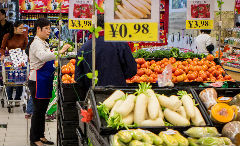Domestic demand boosts economy
2018-04-11
China Daily
Domestic demand is playing an increasingly important role in boosting China’s economic growth, as the country continuously pushes forward its supply-side structural reform and innovation-driven development strategy, the National Bureau of Statistics said on April 10.
With the vitality and momentum of domestic demand further released, China’s economic growth will be maintained within a reasonable range and the economy will also witness higher-quality growth, it said.
Figures from the bureau revealed that domestic demand’s average contribution to economic growth reached 105.7 percent between 2008 and 2017. The contribution from domestic demand reached a record 142.6 percent in 2009, when the global financial crisis hit the hardest, and the lowest contribution was 90.9 percent in 2017, when the global economy stabilized.
Residential income has maintained high-speed growth. Consumption upgrade momentum has kept rising and consumption expenditure has played an even larger role in stable economic growth, the NBS said.
The per capita disposable income in China saw a yearly increase of 7.4 percent from 2013 to 2017, 0.3 percentage point higher than the GDP growth during the same period. Contribution of consumer spending to economic growth in 2017 reached 58.8 percent, 13.5 percentage points higher than that of 2007, it said.
According to the National Development and Reform Commission, total retail sales during the first two months exceeded 6.1 trillion yuan ($968 billion), up 0.2 percent compared with the same period of last year.
Consumption of services has also been expanding steadily. More Chinese people undertook holiday trips during this year’s Spring Festival holiday in February, making a total of 386 million holiday trips, up 12.1 percent year-on-year, according to the China National Tourism Administration. The country also saw a 12.6 percent rise in tourism revenue, which stood at 475 billion yuan, during the holiday, the NBS said.
With infrastructure construction in logistics, telecommunication and transportation in rural areas having further improved, e-commerce is further boosting consumption among rural residents.
Total rural retail sales during the first two months this year reached 903.6 billion yuan, accounting for 14.8 percent of total retail sales, up 0.1 percent compared with the same period of last year.
The Engel’s coefficient, which measures food expenditure as a proportion of total household spending, dropped to 29.3 percent in 2017 from 30.1 percent in 2016, indicating more potential for non-food consumption growth, the NBS said.
“China’s per capita income will continue to rise and supply of quality goods will increase, which will further support consumption upgrading”, which in turn will contribute to the country’s high-quality development, it said.


